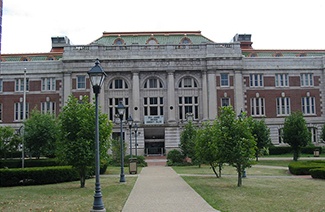3月10日
The Twelve Tribes of Hattie
Thirty-two hours after Hattie and her mother and sisters crept through the Georgia woods to the train station, thirty-two hours on hard seats in the commotion of the Negro car, Hattie was startled from a light sleep by the train conductor’s bellow, “Broad Street Station, Philadelphia!” Hattie clambered from the train, her skirt still hemmed with Georgia mud, the dream of Philadelphia round as a marble in her mouth and the fear of it a needle in her chest. Hattie and Mama, Pearl and Marion climbed the steps from the train platform up into the main hall of the station. It was dim despite the midday sun. The domed roof arched. Pigeons cooed in the rafters. Hattie was only fourteen then, slim as a finger. She stood with her mother and sisters at the crowd ‘sedge, the four of them waiting for a break in the flow of people so they too might move toward the double doors at the far end of the station. Hattie stepped into the multitude. Mama called, “Come back! You’ll be lost in all those people. You’ll be lost!” Hattie looked back in panic; she thought her mother was right behind her. The crowd was too thick for her to turn back, and she was borne along on the current of people. She gained the double doors and was pushed out onto a long sidewalk that ran the length of the station.
The main thoroughfare was congested with more people than Hattie had ever seen in one place. The sun was high. Automobile exhaust hung in the air alongside the tar smell of asphalt softening in the heat and the sickening odor of garbage rotting. Wheels rumbled on the paving stones, engines revved, paperboys called the headlines. Across the street a man in dirty clothes stood on the corner wailing a song, his hands at his sides, palms upturned. Hattie resisted the urge to cover her ears to block the rushing city sounds. She smelled the absence of trees before she saw it. Things were bigger in Philadelphia—that was true—and there was more of everything, too much of everything. But Hattie did not see a promised land in this tumult. It was, she thought, only Atlanta on a larger scale. She could manage it. But even as she declared herself adequate to the city, her knees knocked under her skirt and sweat rolled down her back. A hundred people had passed her in the few moments she’d been standing outside, but none of them were her mother and sisters. Hattie’s eyes hurt with the effort of scanning the faces of the passersby.
A cart at the end of the sidewalk caught her eye. Hattie had never seen a flower vendor’s cart. A white man sat on a stool with his shirtsleeves rolled and his hat tipped forward against the sun. Hattie set her satchel on the sidewalk and wiped her sweaty palms on her skirt. A Negro woman approached the cart. She indicated a bunch of flowers. The white man stood—he did not hesitate, his body didn’t contort into a posture of menace—and took the flowers from a bucket. Before wrapping them in paper, he shook the water gently from the stems. The Negro woman handed him the money. Had their hands brushed?
As the woman with the flowers took her change and moved to put it in her purse, she upset three of the flower arrangements. Vases and blossom tumbled from the cart and crashed on to the pavement. Hattie stiffened, waiting for the inevitable explosion. She waited for the other Negroes to step back and away from the object of the violence that was surely coming. She waited for the moment in which she would have to shield her eyes from the woman and whatever horror would ensue. The vendor stooped to pick up the mess. The Negro woman gesture apologetically and reached into her purse again, presumably to pay for what she’d damaged. In a couple of minutes it was all settled, and the woman walked on down the street with her nose in the paper cone of flowers, as if nothing had happened.
Hattie looked more closely at the crowd on the sidewalk. The Negroes did not step into the gutters to let the whites pass and they did not stare doggedly at their own feet. Four Negro girls walked by, teenagers like Hattie, chatting to one another. Just girls in conversation, giggling and easy, the way only white girls walked and talked in the city streets of Georgia. Hattie leaned forward to watch them progress down the block. At last, her mother and sisters exited the station and came to stand next to her. “Mama,” Hattie said. “I’ll never go back. Never.”
文章概述:
经过三十二个小时的火车,主人公Hattie和她的妈妈和姐姐们到达了费城,车站非常拥挤,人潮涌动,Hattie和她的妈妈姐姐们走散了,当她独自在费城的街道上时,看到四周的一切,内心紧张不安。这时,她看到一个以前从未看到过的推着花车卖花的白人花商,一位黑人妇女在向她买花,黑人妇女不小心把花瓶打碎了,把花弄得一团糟,Hattie以为一场不可避免的冲突将要发生,而且街上的黑人会远远地止步不会卷入这场冲突,然而黑人妇女从钱包掏出钱给了花商,买了花平静地离开了,并没有任何冲突发生。Hattie看着街上的黑人们,内心对这座城市的看法有所改变,并决定一直留在这里。
题目解析:
1. 主旨题 Which choice can best summarize the passage?
2. 目的题 考查文章第一段词组“round as a marble in her mouth”和“a needle in her chest”的效果和目的;
3. 细节题 Hattie在车站和Mother及Sisters分开,对她造成了什么影响;
4. 词汇题 原文词汇是gained,选项词汇有reached, increased, attracted, defeated;
5. 细节题 Hattie第一次来到费城,她对费城的生活的态度是什么样的;
6. 上一题询证;
7. 细节题 黑人妇女和白人花商之间的冲突在即,Hattie认为many black people对此会是什么反应;
8. 上一题询证;
9. 目的题 文章最后一段话第一句Hattielooks more closely at the crowds on the street的作用;
10. 文章最后一段,文章将费城街上的四个谈笑的black girls和佐治亚街上的white girls做了怎样的对比。
相关阅读

















